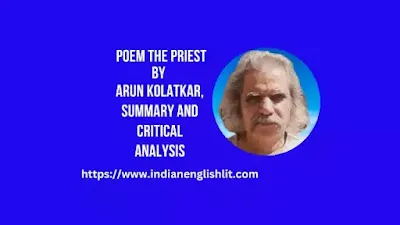Summary of the Poem:
This poem is a sketch of the priest who looks after the temple of Khandoba and who naturally lives either on the premises or quite close to the temple of which he is the custodian and the chief pujari. Of course, it is the priest who gets all the offerings (in cash or in kind) which the pilgrims make to the stone image (or the bronze image) of god Khandoba inside the temple. This poem describes the priest as eagerly and suspensefully waiting for the arrival of pilgrims by the bus which is expected to arrive at Jejuri in the morning.
The priest is waiting for an offering of “heel and haunch” at the altar of god Khandoba. As the bus carrying the passengers has not yet arrived, he wonders whether it has been delayed for some reason. He also asks himself inwardly whether the pilgrims would make sufficient offerings, and whether he would get a “puran poli” in his plate that day. He comes out of the temple in order to take a look at the long road which has a few turnings that make the bus in the distance invisible to the priest. The priest's head is now exposed to the morning sunlight; and he is inwardly reciting a mantra again and again as a form of prayer to have his wishes fulfilled. Then the priest is able to see the bus in the distance. With a thud and a bump, the bus arrives and comes to a stop in front of the priest.
Critical Analysis of the Poem:
The Mood of the Priest
This poem depicts the mood of the priest who is waiting for the arrival of the bus which, as usual, would arrive in the morning, bringing a crowd of pilgrims and tourists. The priest is, of course, not bothered about the religious aspect of the visit of pilgrims. He is more concerned with the offerings which the pilgrims always make when they bow reverently before a stone or bronze image of the god (Khandoba). It is the priest to whom all the offerings go as a matter of right because he is the chief worshipper of the deity in the temple and also the custodian of the temple. Thus there are two questions in the priest's mind: one is whether the bus has been delayed, and the other is whether he would get enough in the form of the offerings by the pilgrims. The priest, in fact, has begun to pray for the speedy arrival of the bus; and his prayer is soon answered.
The Use of Irony in the Poem:
The use of irony in this poem is perfectly obvious. The poet is evidently mocking at the priest's worldliness and his greed. The priest is not a genuine priest in any sense of the word. Not only does his livelihood depend upon the offerings made by the pilgrims but he would like to enjoy some of the luxuries of life too.
Some Striking Metaphors and Similes:
Some of the metaphors and similes in the poem are noteworthy: “An offering of heel and haunch;” “with a quick intake of testicles;” the sun patting the priest's cheek familiarly “like the village barber;” the priest's stare beginning to grow slowly “like a wart upon his nose”; “a catgrin on its face / ready to eat pilgrim / held between its teeth”—these are the striking metaphors and similes in the poem.







